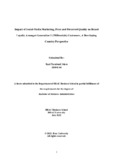| dc.contributor.advisor | Islam, Md Asadul | |
| dc.contributor.advisor | Hafiz, Nusrat | |
| dc.contributor.author | Islam, Kazi Tasnimul | |
| dc.date.accessioned | 2023-01-09T05:03:41Z | |
| dc.date.available | 2023-01-09T05:03:41Z | |
| dc.date.copyright | 2022 | |
| dc.date.issued | 2022-07 | |
| dc.identifier.other | ID 18304144 | |
| dc.identifier.uri | http://hdl.handle.net/10361/17694 | |
| dc.description | This thesis is submitted in partial fulfillment of the requirements for the degree of Bachelor of Business Administration, 2022. | en_US |
| dc.description | Cataloged from PDF version of thesis. | |
| dc.description | Includes bibliographical references (pages 52-57). | |
| dc.description.abstract | This study investigated the impact of social media marketing, price, and brand loyalty among
generation Y consumers (millennials). It's based on secondary research, and the first chapter
outlines its rationale. The study's background, problem statement, research purpose, and
importance are discussed. The literature focuses on how perceived quality, pricing strategy,
and social media marketing affect brand loyalty among generation Y consumers in Bangladesh.
A literature review finds that businesses are losing current consumers, and that this trend is
especially pronounced among companies dealing with Generation Y clients, who have unique
traits such as the capacity to synthesize weaker bonds to objects. It has been shown that younger
customers are the most economically active and engaged consumers. This sector has a strong
affinity for certain brands and is willing to spend more to support them. This generation gives
considerable weight to how others view a brand's image. They are pioneers in the adoption of
novel marketing strategies as a result. As a result of their broad access to social media,
millennials have become more discerning customers. Generation Y is more concerned with the
aesthetics and quality of a product than prior generations. However, the present research does
not conclusively establish that social media marketing may be used to improve brand loyalty
among millennials in Bangladesh and elsewhere.
Methodology emphasizes secondary data sources like Google forms and offline surveys. After
evaluating online and offline data, 178 respondents were utilized to assess a person's
connection between factors using SPSS software. The descriptive study and conclusions
showed a substantial association between pricing, perceived quality, social media marketing,
and brand loyalty. The influence of social media marketing, cost, and perceived quality on
Brand loyalty among generation Y in Bangladesh is discussed.
This research will help specialists, practitioners, and academics. Overall, the study's findings,
limitations, and future research recommendations were given. | en_US |
| dc.description.statementofresponsibility | Kazi Tasnimul Islam | |
| dc.format.extent | 57 pages | |
| dc.language.iso | en | en_US |
| dc.publisher | Brac University | en_US |
| dc.rights | Brac University theses are protected by copyright. They may be viewed from this source for any purpose, but reproduction or distribution in any format is prohibited without written permission. | |
| dc.subject | Social media | en_US |
| dc.subject | Social media marketing | en_US |
| dc.subject | Perceived quality | en_US |
| dc.subject | Generation Y | en_US |
| dc.subject | Millennials | en_US |
| dc.subject | Price | en_US |
| dc.subject | Bangladesh | en_US |
| dc.subject | Developing country | en_US |
| dc.subject.lcsh | Online marketing | |
| dc.title | Impact of social-media marketing, price and perceived quality on brand loyalty amongst generation Y (Millennials) customers, a developing country perspective | en_US |
| dc.type | Thesis | en_US |
| dc.contributor.department | Brac Business School, Brac University | |
| dc.description.degree | B. Business Administration | |

